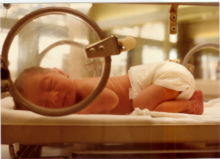- Neonatal nursing
-
 An infantal in a neonatal intensive care unit
An infantal in a neonatal intensive care unit
Neonatal nursing is the provision of nursing care for newborn infants up to 28 days after birth. The term neonatal comes from neo, "new", and natal, "pertaining to birth or origin".[1] Neonatal nurses are a vital part of the neonatal care team.[2]
Contents
Levels
There are three different levels of neonatal nursery where a neonatal nurse might work:[3]
- Level I consists of caring for healthy newborns. Level I nurseries are now uncommon in the United States. Healthy babies typically share a room with their mother, and both patients are usually discharged from the hospital quickly.[4]
- Level II provides intermediate or special care for premature or ill newborns. At this level, infants may need special therapy provided by nursing staff, or may simply need more time before being discharged.
- Level III, the Neonatal intensive-care unit (NICU), treats newborns who cannot be treated in the other levels and are in need of high technology to survive. Nurses comprise over 90 percent of the NICU staff.[2]
Neonatal nurses may choose whether or not they wish to work in the NICU.
Qualifications and requirements
Healthcare institutions have varying entry-level requirements for neonatal nurses. Neonatal nurses are Registered Nurses (RNs), and therefore must have an Associate of Science in Nursing (ASN) or Bachelor of Science in Nursing (BSN) degree. Some countries or institutions may also require a midwifery qualification.[5] Some institutions may accept newly-graduated RNs who have passed the NCLEX exam; others may require additional experience working in adult-health or medical/surgical nursing.[3]
Some countries offer postgraduate degrees in neonatal nursing, such as the Master of Science in Nursing (MSN) and various doctorates. A nurse practitioner may be required to hold a postgraduate degree.[5] The National Association of Neonatal Nurses recommends two years' experience working in a NICU before taking graduate classes.[3]
As with any registered nurse, local licensing or certifying bodies as well as employers may set requirements for continuing education.[3]
There are no mandated requirements to becoming an RN in a NICU, although neonatal nurses must have certification as a Neonatal Resuscitation Provider. Some units prefer new graduates who do not have experience in other units, so they may be trained in the specialty exclusively, while others prefer nurses with more experience already under their belt.
Intensive care nurses endure intensive didactic and clinical orientation, in addition to their general nursing knowledge, to provide highly specialized care for critical patients. Their competencies include the administration of high-risk medications, management of high-acuity patients requiring ventilator support, surgical care, resuscitation, advanced interventions such as extracorporeal membrane oxygenation or hypothermia therapy for neonatal encephalopathy procedures, as well as chronic-care management or lower acuity cares associated with premature infants such as feeding intolerance, phototherapy, or administering antibiotics. NICU RNs undergo annual skills tests and are subject to additional training to maintain contemporary practice.
References
- ^ Harper, Douglas. "neonatal". Online Etymology Dictionary. Douglas Harper. http://www.etymonline.com/index.php?term=neonatal. Retrieved October 26, 2010.
- ^ a b Whitfield, Jonathan M.; Peters, Beverly A.; Shoemaker, Craig (July 2004). "Conference summary: a celebration of a century of neonatal care". Proceedings (Dallas: Baylor University Medical Center) 17 (3): 255–258. PMC 1200660. PMID 16200108. http://www.pubmedcentral.nih.gov/articlerender.fcgi?tool=pmcentrez&artid=1200660. Retrieved August 26, 2010.
- ^ a b c d "Neonatal Nurse". Nurses for a Healthier Tomorrow. Nurses for a Healthier Tomorrow. http://www.nursesource.org/neonatal.html. Retrieved October 26, 2010.
- ^ Selga, Anna May A.. "Hospital Length of Stay and Readmission Rates for Normal Deliveries: a controlled evaluation". Ilocos Training and Regional Medical Center. Manila: Department of Health, Republic of the Philippines. Archived from the original on April 23, 2007. http://web.archive.org/web/20070423125720/http://www.doh.gov.ph/itrmc/hospital_length_of_stay.htm. Retrieved October 26, 2010.
- ^ a b "Frequently Asked Questions". Global Unity for Neonatal Nurses. Boston: Council of International Neonatal Nurses. 2009. http://www.coinnurses.org/faqs.htm. Retrieved October 26, 2010.
External links
- Association of Women's Health, Obstetric and Neonatal Nurses
- The Academy of Neonatal Nursing
- Pre Conception& Neonatal
 Nursing
NursingLevels of Practice GeneralistsAdvanced PracticeNurse education
and licensureSpecialties and
areas of practiceAmbulatory care · Cardiac · Critical care · Emergency · Faith community · Flight · Geriatrics · Home health · Hyperbaric · Legal nurse consultant · Maternal-child · Medical-surgical · Midwifery · Military practice · Neonatal · Nurse educator · Nursing management · Obstetrics · Oncology · Orthopedics · Palliative care · Pediatrics · Perianesthesia · Perioperative · Psychiatry and mental health · Private duty nursing · Public health · School nursing · WOCNNursing process Nursing classification
systemsMiscellaneous Unlicensed assistive personnel · Bullying in nursing · Nursing theory · Timeline of nursing history · Nurse-led clinic · Men in nursing · Nurse stereotypes · List of nursing organizations · Nursing journals · List of nurses · Nurse-client relationship · Nursing credentials and certifications · Evidence-based nursing · Nursing researchCategories:- Nursing specialties
Wikimedia Foundation. 2010.
